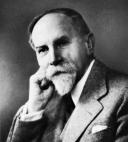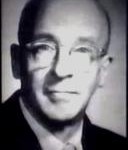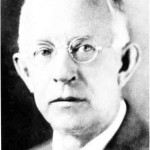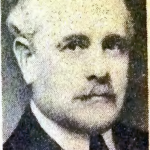Leadership in 1940

Adolph Meyer
¶ 1 Leave a comment on paragraph 1 0 Adolph Meyer’s second term as President was marked by improved organization and planning of the annual conference as well as changes in the by-laws and constitution to allow state and regional leaders to be members of the advisory council. This Council was given the responsibility of developing regional, state and local conferences.
¶ 2 Leave a comment on paragraph 2 0 The following is an excerpt from Meyer‘s Presidential Address:
¶ 3 Leave a comment on paragraph 3 0 Man has been very slow to allow himself to submit to the process of scientific and truly science-making study. The family in our own midst as a going concern has only in the last two decades received active consideration when it started to be beset by problems of economic, social, and existential maintenance, in which today civilization herself is involved and challenged . . . according to the extent to which our leading institutions of higher learning persist in a failure to create, frankly, a well-defined science of man, and allow large numbers of future leaders of man to graduate without having brought together in a well-rounded form the natural sciences as well as the humanities and vice versa, many will assume authority in matters of responsibilities for human life for the handling of which they are no better qualified than the uneducated.
¶ 4 Leave a comment on paragraph 4 0 An anonymous donor established five lifetime memberships in NCFR that were matched by donations from over 70 NCFR members. The first recipients included Dr. & Mrs. Paul Sayre, Mrs. Adolph Meyer, Dr. & Mrs. Ernest Groves, Rabbi Sidney Goldstein, and Dr. Ernest W. Burgess. The anonymous donor wished to honor the work of these recipients in establishing NCFR.
¶ 5 Leave a comment on paragraph 5 0 The “White House Conference on Children in a Democracy,” called by President Franklin D. Roosevelt, was held in Washington, DC, January 18–20. NCFR leaders were active members of this conference. It was divided into 11 sections devoted to such topics as “Family Life and the Child,” “Families and Their Incomes,” “Families in Need of Assistance,” “Families and Their Dwellings,” and “Family as the Threshold of Democracy.” The chief recommendations included a demand for immediate ratification of the Federal Child Labor amendment; assistance to boys and girls in work projects, to include those on parole from reformatories or on probation; adoption by the federal government of a policy of continuing and flexible work programs; cooperation of state and local governments to provide work for unemployed parents; improving family housing; better religious instruction for all children; and realignment of school units to assure the best possible education for all children and a fair method of assessing taxes for education. NCFR urged its state and regional affiliates to include at least one segment of the platform to be presented at their local and regional conferences.
Gallery
- Adolph Meyer
- Paul Sayre
- Ernest Groves, NCFR president 1941
- Sidney Goldstein
- Ernest Burgess






Comments
0 Comments on the whole Page
Login to leave a comment on the whole Page
0 Comments on paragraph 1
Login to leave a comment on paragraph 1
0 Comments on paragraph 2
Login to leave a comment on paragraph 2
0 Comments on paragraph 3
Login to leave a comment on paragraph 3
0 Comments on paragraph 4
Login to leave a comment on paragraph 4
0 Comments on paragraph 5
Login to leave a comment on paragraph 5
0 Comments on paragraph 6
Login to leave a comment on paragraph 6
0 Comments on paragraph 7
Login to leave a comment on paragraph 7
0 Comments on paragraph 8
Login to leave a comment on paragraph 8
0 Comments on paragraph 9
Login to leave a comment on paragraph 9
0 Comments on paragraph 10
Login to leave a comment on paragraph 10